
Rice, NASA extend Space Act Agreement
Rice and NASA extend their pact to share research and outreach through a Space Act Agreement.

Rice, NASA extend Space Act Agreement
Rice and NASA extend their pact to share research and outreach through a Space Act Agreement.
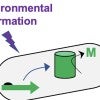
Rice team eyes cells for sophisticated data storage
Rice University receives National Science Foundation support to turn living cells, starting with bacteria, into random-access memory devices. These will be able to store and report data about their environments.

Smalley-Curl Institute rewards students’ summer research
The Smalley-Curl Institute held its annual Summer Research Colloquium Aug. 5.
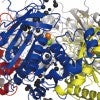
Rice models moving ‘washers’ that help DNA replicate
Rice researchers model a key mechanism by which DNA replicates. The study could help identify new targets to treat disease.

Halas, Nordlander win prestigious Eni Energy Transition Award
Rice’s Naomi Halas and Peter Nordlander have won the prestigious 2022 Eni Energy Transition Award.
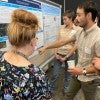
IBB picks top posters by summer research undergrads
The Institute for BioSciences and Engineering holds its annual Summer Research Experiences for Undergraduates symposium and poster competition.
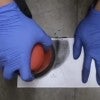
Water can’t touch this sanded, powdered surface
Rice scientists and engineers develop a one-step method involving sandpaper and powder to make robust superhydrophobic materials.

Cherukuri named Rice University’s first vice president for innovation
Paul Cherukuri, the executive director of the Institute of Biosciences and Bioengineering, has been named Rice University’s first vice president for innovation.

Most but not all Texas coaches say they’ll plan for climate change
A survey of Texas college and high school coaches, trainers and athletic directors suggests many are not taking climate change into account as they plan their programs’ futures.

VegSense makes sense for forest studies
Rice ecologists have created open-source software to rapidly gather field data with Microsoft’s mixed reality headset.

Ramesh named Rice University’s vice president for research
Ramamoorthy Ramesh, a condensed matter physicist and materials scientist with more than 25 years in academia, industry, national labs and government service, has been named Rice University’s vice president for research.
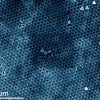
Tetrahedrons assemble! Three-sided pyramids form 2D structures
Rice chemists have discovered pyramid-shaped gold nanoparticles put their own twist on 2D self-assembly.
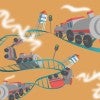
Synthetic tools conduct messages from station to station in DNA
Bioengineers used deactivated Cas9 fusion proteins to synthetically control gene expression and reveal new details about natural processes in human cells.
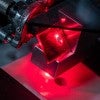
Strain-sensing smart skin ready to deploy
Carbon nanotubes’ natural fluorescence enables a method to detect high strain concentrations, which can lead to damage that threatens the integrity of critical infrastructure like aircraft, buildings, pipelines, bridges and ships.

RSVPs requested for Aug. 4 memorial celebration honoring longtime mathematics professor John Hempel
Rice will host an Aug. 4 memorial celebration to honor the life of longtime math professor John Hempel.